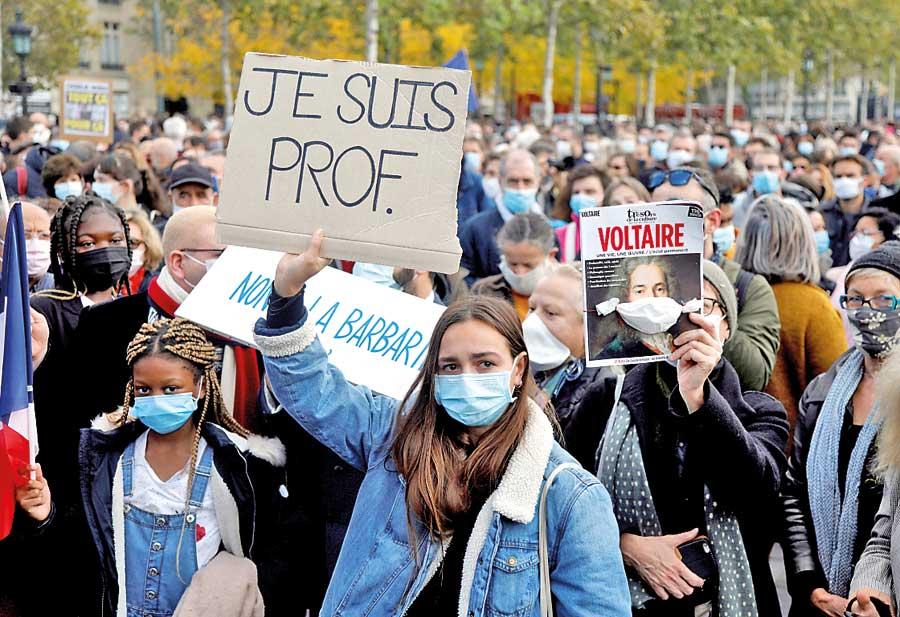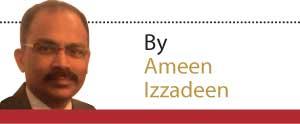23 Oct 2020 - {{hitsCtrl.values.hits}}

People gather at the Place de la Republique in Paris to pay tribute to Samuel Paty, the French teacher who was beheaded on the streets of the Paris suburb of Conflans-Sainte-Honorine, France, October 18. Placard reads “I am a teacher”. Some hold up an image of French philosopher Voltaire. REUTERS/Charles Platiau
“I disapprove of what you say, but I will defend to the death your right to say it.” This was how British writer Evelyn  Beatrice Hall captured great French philosopher Voltaire’s free speech zeal. Though not directly attributed to Voltaire, the oneliner has, ever since, become the scripture of free speech champions and inspired many a human rights activist to defend and even die for the cause of free speech.
Beatrice Hall captured great French philosopher Voltaire’s free speech zeal. Though not directly attributed to Voltaire, the oneliner has, ever since, become the scripture of free speech champions and inspired many a human rights activist to defend and even die for the cause of free speech.
Regarded as the first proponent of the doctrine of separation between the Church and the State, Voltaire in his Treatise on Tolerance, advocated total toleration of religious belief, but in the same breath, he defended the right to criticise religion and belief systems. He famously said, “Tolerance has never provoked a civil war; intolerance has covered the Earth in carnage.” Voltaire believed religion, as it existed at his time, to be the enemy of reason, so much so he preferred an absolute monarchy to what he saw as the corrupt institution of religion.
Some 242 years after his death, his views on criticism of religion are gaining wide acceptance worldwide, especially in France, in the aftermath of last week’s gruesome beheading of a French teacher who like Voltaire advocated the right to criticise religion. The terror incident was attributed to a radical Islamic teenager who was said to have been disturbed by teacher Samuel Paty’s defence of pejorative cartoons that negatively depicted Islam’s Prophet Muhammad – the same images which led to a terror attack by Islamic gunmen on the offices of satirical magazine Charlie Hebdo in 2015.
Five year ago, too, more than a million people took part in what was then described as the biggest gathering in defence of free speech. Eight Charlie Hebdo journalists lost their lives when terrorists said to be linked to Al-Qaeda in the Arabian Peninsula attacked the magazine’s head office to avenge what they saw as the character assassination of Prophet Muhammad by republishing the cartoons which first appeared in a Danish newspaper.
Like in the aftermath of the Charlie Hebdo terror attack, last Sunday’s beheading of the civics teacher has also rejuvenated a movement in defence of free speech in France. As rightly advocated by Voltaire, they are defending the right to criticise religion or, as French President Emmanuel Macron sees it, the right to blaspheme any religion.
Sunday’s attack has once again portrayed Islam in a negative light. Terrorism is not part of the prophet’s Islam, but tolerance is. Any Muslim who reads the Quran cannot overlook the verses that exhort the virtues of tolerance. During the prophet’s time, he was derided as a madman possessed by devil, a poet misleading the youth, a soothsayer causing division in society, whereas his intention was to bring social reforms and restore the monotheism which Patriarch Abraham (Ibrahim) practised and preached. He and his followers faced economic boycott, social ostracisation, death threats and physical and psychological torture. Yet he urged his followers to exercise what the Quran describes as Sabran Jameela or beautiful patience and hajran jameela or keeping away from the provocateurs in a noble manner.
But some of his present day followers, ignoring more than 90 Quranic verses on patience, have taken the law into their hands and become terrorists and cold-blooded murderers of innocent people as those who committed the atrocious terror attacks in Sri Lanka on Easter Sunday in 2019 and as the lorry driver who rammed his vehicle into a crowd killing 116 people in Nice, France on Bastille day in 2016. The number of such terror attacks is too numerous to mention.
Excessive love for the prophet cannot and should not be displayed by resorting to terrorism and mislabelling it jihad. A true lover of the prophet is the one who exercises patience no matter how hurtful the abuse is and conquers one’s base self while being a reflection of the teachings of the gentle and merciful character of the Prophet.
"Just as free speech is subjected to laws dealing with tort, defamation, hate speech and security, it should also be subjected to the laws of human decency which, among other things, demands that one should not deliberately cause pain of mind to another"
The Muslims’ failure to live the Islam of the Prophet has brought ridicule to their religion and prompted countries such as France and China to ban niqab and other Islamic practices. In France, President Macron is set to introduce a bill aimed at creating a French Islam, though the move has triggered a debate on whether it violates the constitutional provision of separating the Church and the State. Some French Muslims have said the bill is yet another attempt by successive French governments to warn the Muslims that if they could not adopt Western values, they must shut up or get out. They say this is part of daily humiliation they undergo.
On the other hand, the right to free speech should not be exercised without responsibility. Free speech can be hate speech if not exercised with responsibility.
Free speech is not absolute. Free speech is limited by hate speech. In France, there are laws to govern hate speech, but Muslims, who make up nine percent of the population, say Islamophobic comments are often defended as free speech. Alleging there are double standards in the implementation of the law, they claim that the Jews enjoy the full protection of the law, so much so that to question the number of those killed in the holocaust is not regarded as free speech or academic freedom but as hate speech based on anti-Semitism.
Just as free speech is subjected to laws dealing with tort, defamation, hate speech and security, it should also be subjected to the laws of human decency which, among other things, demands that one should not deliberately cause pain of mind to another. Character assassinating a liberative prophet who died 1400 years ago is no free speech. When Charlie Hebdo resorted to pornographic portrayal of the prophet, it is not freedom of expression. It is public display of devilry devoid of human decency and values. It falls within the UN definition of hate speech. According to the UN, hate speech is “any kind of communication in speech, writing or behaviour, that attacks or uses pejorative or discriminatory language with reference to a person or a group on the basis of who they are, in other words, based on their religion, ethnicity, nationality race, colour, descent, gender or other identity factor.”
Criticism of Islam or any religion is fine and should be encouraged. It is even okay to call a religion a devilish ideology or terror philosophy, provided such criticism is part of an intellectual discourse. Bashing the religious leaders whom they love to hate is certainly not freedom of expression.
24 Oct 2024 42 minute ago
24 Oct 2024 57 minute ago
24 Oct 2024 2 hours ago
24 Oct 2024 2 hours ago
24 Oct 2024 2 hours ago